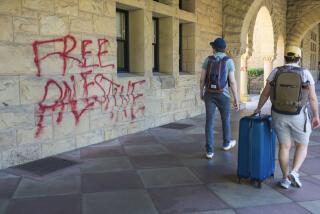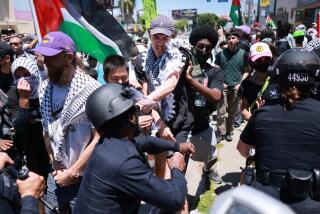In San Ramon, the Protest Is Polite
- Share via
SAN RAMON — It really was civil disobedience.
Fifty-nine protesters -- nurses, teachers, a priest and students -- were arrested in an orderly demonstration early Monday morning outside ChevronTexaco Corp.’s world headquarters.
The arrests were made after authorities called the demonstrators “ladies and gentlemen,” an organizer referred to a sergeant as “sir” and the company even allowed the demonstrators to block the main gate.
The display of manners was in sharp contrast with previous protests in San Francisco and with last week’s demonstration at the Port of Oakland, during which officers fired nonlethal weapons at activists, injuring some, and a handful of demonstrators threw rocks, concrete and bolts.
Monday’s event in this hilly suburb east of San Francisco was not without planning, said San Ramon Police Chief Brian Lindblom.
When denying demonstrators a special events permit, the police nevertheless advised, “Don’t let that discourage you from coming out to picket and demonstrate.”
Then they sat down together to discuss what was likely to happen.
“Our underlying focus was nonviolence and no destruction of property,” the chief said. Early Monday morning, he advised his officers to “adjust your demeanor to the demeanor of the demonstrators.”
So when the 6-foot-4, 250-pound Sgt. Chris Stangel gingerly approached every demonstrator blocking the road, he lightly tapped each on the shoulder.
“I want to let them know I’m gentle,” Stangel explained. And when an elderly protester warned that he suffers from arthritis, the sergeant assured him, “I will accommodate your shoulder.”
Then Stangel said what he had said to the dozens of other protesters blocking entry into ChevronTexaco’s world headquarters:
“Please do not resist the officers. They are exceptional people. They will not hurt you.”
A phalanx of police and sheriff’s deputies swiftly moved in, accompanying the demonstrators to a waiting van. A few resisted and had to be carried, legs and arms splayed, but even that was done with care.
The protesters were arrested for allegedly obstructing the road; one was charged with battery on an employee. By midmorning, one of three entrances to the offices of the seventh-largest company in the nation was reopened to traffic.
Observing the cautious way in which picketers were arrested and carted off Monday, sign-waver Nancy Reimer, 60, said it almost seemed “like a dance.”
The peaceful activists were protesting an array of issues they said were no less important to them now that the war appeared to be winding down.
They protested, they said because of ChevronTexaco’s “connection to the war in Iraq”; because National Security Advisor Condoleezza Rice, a former ChevronTexaco board member, maintains ties to the company; because, they said, company facilities pollute the Bay area and the Ecuadorean Amazon; and because, they said, ChevronTexaco will now steal Iraq’s resources.
“Their claims are patently false or misleading,” said Stan Luckoski, ChevronTexaco’s senior communications consultant. “They do a disservice to anyone seriously interested in discussing the issues they raise.”
Asked about the company’s interests in Iraq, Luckoski said, “We believe Iraqi oil belongs to the Iraqi people. How they choose to develop it is up to them. We do believe, though, that U.S. companies should be permitted to pursue opportunities to invest on an equal basis should the opportunity arise.”
While officials were braced for several thousand demonstrators, only several hundred showed.
As the Brass Liberation Orchestra, a ragtag collection of musicians including a tuba player and accordionist, played, a handful of ChevronTexaco employees slipped through the picket lines.
Waving to the passing traffic, San Francisco bartender Jeff Grudler, with hairy legs poking out from a woman’s purple suit and pearls, wore a Condoleezza Rice face mask. His sign read “This Has Nothing to Do With Oil.”
Pacing back and forth in front of the demonstrators like a caged tiger, Mike Conklin, a local resident with two sons in Iraq, carried a small American flag. His black eyebrows rose as he denounced the demonstrators, saying they have “the right to be stupid.”
Warned in advance to show up for work before dawn or not at all, ChevronTexaco’s 3,700 employees drove through the wide entrance before 6 a.m., when the demonstration was scheduled to begin.
Shortly afterward, a handful of the most committed demonstrators formed what they called “a hard blockade” across the main entrance.
Linked arm in arm by metal chains covered by cylinders -- what demonstrators call lock boxes -- and attached to an old Volvo station wagon with deflated tires, they prevented traffic from entering and police from arresting them without great harm.
At one point, a man in a black Mercedes drove up as if intending to hit them. David Solnit, a construction worker, dropped to his knees in front of the car. He was, he said, willing to be run over if that’s what it took to prevent ChevronTexaco from “a second invasion of Iraq -- extracting its resources.”
Moments later, the Mercedes driver, cell phone to his ear, backed away.
With the chained demonstrators blocking the main entrance, police and ChevronTexaco ceded the space to them.
The side entrance, however, was more porous, and it was there that police exercised restraint while making arrests. When vans were full of arrested demonstrators, Stangel asked those remaining to “please” move aside, promising “the folks” they could return immediately.
Observing “how nice these guys are,” high school teacher John Parkin, who’d been milling about, considered sitting down and agreeing to be arrested.
“It’s a good day to get arrested,” he said.
*
Times special correspondent Chris O’Connell contributed to this report.
More to Read
Sign up for Essential California
The most important California stories and recommendations in your inbox every morning.
You may occasionally receive promotional content from the Los Angeles Times.













